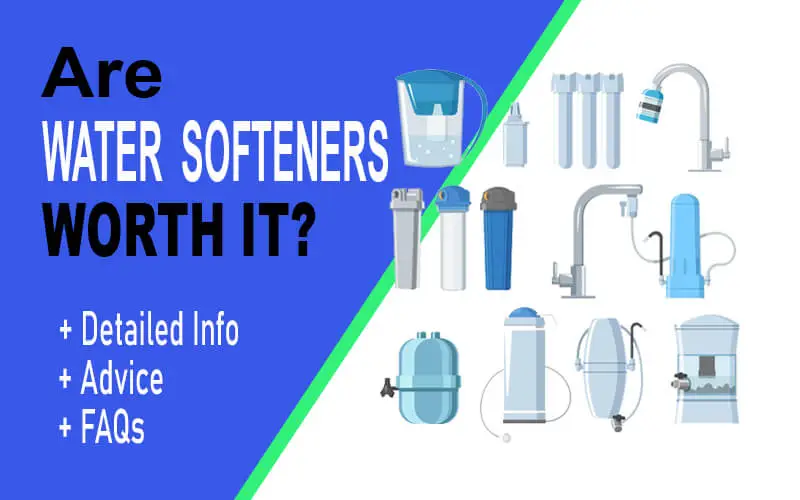Find Out Now! Are Water Softeners Worth It in 2023?
Are water softeners worth it? Water softeners have become increasingly popular in recent years as more and more people are looking for ways to improve their water quality.
While there are many different types of water softeners on the market, they all work to remove hardness from water, making it softer and easier to use. There are many benefits to using a water softener, including improved hair and skin health, reduced scaling on plumbing fixtures, and extended appliance life.
Are Water Softeners Worth It?
Water softeners are an investment that many homeowners consider but may not fully understand the advantages and benefits. Are water softeners worth it? There is no doubt about it. Water softeners assist you with taking care of numerous normal water-related issues around the home and set aside your cash.
Hard water abandons mineral stores that can harm plumbing installations, machines, and dress. A water softener removes these minerals, extending the life of your pipes, appliances, and clothes.
Likewise, hard water can make cleansers less viable, leaving you feeling grimy after a shower. Softened water leads to cleaner skin and hair because soap lathers better in softened water.
Finally, hard water requires more detergent and energy to clean than softened water. This implies that softened water will get a good deal on your service bills after some time.
Why Are Water Softeners Worth It?
If you have hard water and can afford the cost, a water softener can be a good investment that will help protect your appliances and fixtures and improve your quality of life. Here’s how:
Here are a few reasons why water softeners are worth it.
1. Water softeners can stretch the life expectancy of your home’s apparatuses. This is because hard water can cause mineral buildup in your appliances, which can lead to decreased efficiency and even breakage over time.
2. The use of water softeners can also keep the skin and hair of your family from developing dryness and irritation. This is on the grounds that hard water can strip away normal oils, leaving skin feeling dry and bothered. It is much gentler on skin and hair to use soft water.
Water softeners provide many benefits for your home and your family’s health. If you’re on the fence about whether or not to install one, these reasons may help you make up your mind.
Does a Water Softener require a lot of energy?
On the off chance that you’ve been thinking about a water softener for your home yet are stressed over energy utilization, don’t be. A water softener doesn’t use as much energy as you might expect.
As a matter of fact, a water softener just uses a modest quantity of power to run the siphon and recover the gum dots. The actual process of softening water doesn’t require any electricity at all.
So, if you’re looking for a way to save money on your utility bills and help out the environment, consider investing in a water softener. You’ll be shocked at the amount of a distinction it can make.
Is a Water Softener Worth the Initial Investment?
On the off chance that you’ve contemplated whether a water softener merits the underlying venture, the response is a resonating yes. A water softener will expand the life expectancy of your home’s machines, dishes, and clothing, and it will likewise set aside your cash over the long haul.
Hard water can wreak havoc on your home’s plumbing and appliances, costing you hundreds or even thousands of dollars in repairs and replacements. A water softener will eliminate the minerals that cause hard water, safeguarding your home from expensive harm.
In addition to protecting your home, a water softener will also save you money on your monthly bills. Hard water requires more cleanser and detergent to clean garments and dishes, and that implies higher service bills. A water softener reduces your soap usage, saving you monthly money.
FAQs: Are Water Softeners Worth it?
How many watts of electricity is used in a water softener?
According to a recent study, the average water softener uses around 70 kWh of electricity per year. This means that if you have a water softener, it is likely using about as much electricity as a small appliance in your home.
While this may seem like a lot of electricity, it is essential to remember that water softeners are designed to save you money in the long run by reducing the amount of soap and detergent you need to use. Furthermore, they can expand the existence of your pipes by keeping hard water from harming lines and apparatuses.
If you are concerned about the amount of electricity your water softener uses, you can take some simple steps to reduce its energy consumption. For example, make sure only to run the softener when necessary and choose a model with an efficient energy-saving mode.
What are the costs associated with water softeners?
Water softeners are an extraordinary method for working on the nature of your water, however they accompany a couple of cost contemplations. The initial cost of a water softener can range from $400 to $6,000, depending on the size and type of unit you choose.
Establishment costs will likewise change contingent upon the intricacy of your framework. Once your water softener is up and running, you can expect to see an increase in your monthly water bill due to the additional salt required to regenerate the unit.
However, this cost is typically offset by soap and detergent usage savings. Water softeners are a shrewd hypothesis that can save your money over an extended time.
Are water softeners waste water?
Water softeners are not a waste of water as they are highly efficient. Many kinds of water softeners are accessible on the lookout, and each enjoys its own benefits and impediments.
The most well-known sort of water softener is the ion exchange water softener, which utilizations salt to eliminate minerals from hard water. This type of water softener is very effective but can be expensive to maintain.
One more kind of water softener is the reverse osmosis water softener, which utilizes a channel to eliminate minerals from hard water. This sort of water softener is more affordable than the ion exchange water softener yet isn’t as powerful.
How much water does a water softener use?
A water softener uses approximately 35 to 65 gallons of water per day. The amount of water that a softener uses depends on the unit’s size and the water’s hardness.
Harder water requires more time to soften and therefore uses more water. Most units have a holding tank that stores the softened water, so the actual amount of water used may be less than 35 gallons per day.
If you are considering purchasing a water softener, it is essential to factor in the cost of additional water usage. Notwithstanding, many people find that the advantages of softened water offset the expense of extra water use.
Conclusion:
Are water softeners worth it? Yes! water softeners are certainly worth the effort assuming you live in a space with hard water. It will set aside your cash over the long haul by expanding the existence of your machines and causing your skin and hair to feel quite a bit improved. On the off chance that you have the chance to introduce a water softener, certainly do it. Water softeners are an important machine for some homes.
The advantages of softened water make it worth the underlying speculation and the support costs. A water softener for homes with hard water can improve the quality of life by making appliances last longer and cleaner dishes and clothing.


![Ultimate Guide: It’s All About The Benefits Of Dehumidifiers [2023]](https://prohouseideas.com/wp-content/uploads/2023/01/benefits-of-dehumidifiers-768x480.webp)
![Get Better Types of Generators for Home and Outdoor [2023]](https://prohouseideas.com/wp-content/uploads/2022/12/types-of-generators-768x480.webp)

![How to Clean a Vicks Humidifier? [Daily & Weekly Plan] 2023](https://prohouseideas.com/wp-content/uploads/2023/01/how-to-clean-a-vicks-humidifier-768x480.webp)
![Find Out Now! Best Water Softener Salt [#3 is Life Saving]](https://prohouseideas.com/wp-content/uploads/2022/12/best-water-softener-salts-768x480.webp)
![How to Transport a Generator the Right Way? [+Safely] 2023](https://prohouseideas.com/wp-content/uploads/2022/09/how-to-transport-a-generator-768x480.webp)